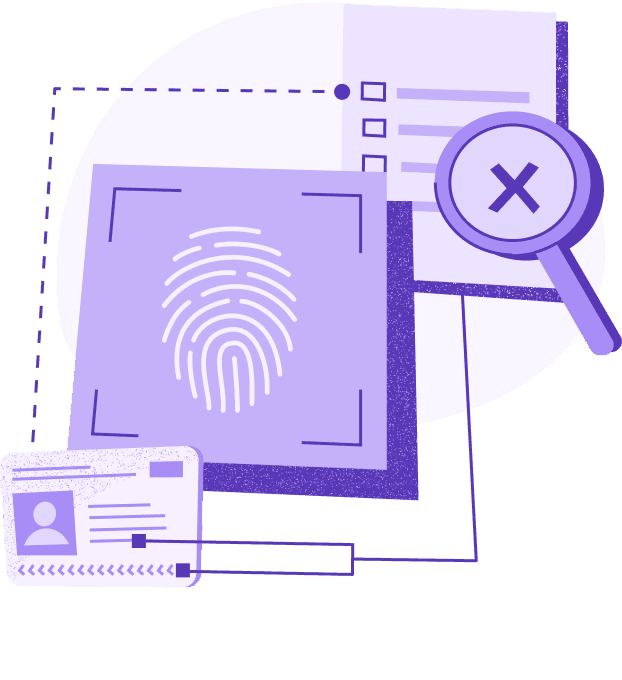Article
7 min read
A Guide to Employee Background Checks in Japan
Employee background checks
Legal & compliance

Author
Michał Kowalewski
Last Update
September 05, 2025

Table of Contents
What employers need to know before running background checks in Japan
Are background checks legal in Japan?
What types of background checks are illegal in Japan?
Industries where background checks are common in Japan
Types of employee background checks in Japan
Background check mistakes to avoid in Japan
Step-by-step guide to employee background checks in Japan
Run employee background checks with Deel
Key takeaways
- Employers must align with Japan's Act on the Protection of Personal Information (APPI) for lawful background checks, emphasizing the need for candidate consent
- Background checks are particularly vital in finance, healthcare, education, and government sectors in Japan, where they serve to verify the trustworthiness and qualifications of candidates
- Non-compliance with Japan's stringent privacy laws during background checks can result in significant penalties, underlining the importance of adhering to legal standards
Employee background checks should be an integral part of your hiring process in Japan. Although not mandatory, they are a common practice, especially in the finance, healthcare, education and government sectors.
Japan, with its stable economy and significant global economic share, is an attractive destination for foreign investments and global hiring. However, adhering to Japan's stringent privacy laws for employee background checks can be challenging for international businesses, as privacy violations can incur serious penalties.
In this article, we’ll outline:
- Ways to run an effective and legal employment screening in Japan
- Step-by-step process of a thorough employee screening
- Mistakes to avoid when performing background checks in Japan
- The common types of employee check in Japan
What employers need to know before running background checks in Japan
An employee background check is the process of verifying a potential hire’s work history, education, professional qualifications, and any criminal records they might have. It’s particularly beneficial to run a background check before finalizing an employment offer or signing a contract to ensure the candidate meets the company's standards and requirements.
In Japan, the handling of personal information is governed by the Act on the Protection of Personal Information (APPI) and enforced by the Personal Information Protection Commission (PPC)
-
Act on the Protection of Personal Information (APPI): This legislation regulates the collection, use, and distribution of personal data, ensuring that individuals have the right to privacy and control over their personal information. When conducting background checks, employers must adhere to the APPI and obtain the candidate's written consent before accessing their personal data
-
Personal Information Protection Commission (PPC): The central authority overseeing the implementation and enforcement of the APPI in Japan. Recruiters and employers should familiarize themselves with the guidelines provided by the PPC to ensure compliance with the legal framework governing background checks
Are background checks legal in Japan?
Background checks are legal in Japan, provided that they are conducted in compliance with the APPI and PPC.
Due to the country's strong emphasis on personal privacy, accessing an individual's personal details, such as criminal, civil, or educational records, is not permitted without their explicit consent. Most personal information isn't publicly accessible, which means legal documents like subpoenas or court orders for access are difficult to obtain without a candidate's written approval.
Additionally, the information obtained through background checks must be handled with strict confidentiality and used solely for the intended purpose, such as assessing the candidate's suitability for a role.
Background checks
What types of background checks are illegal in Japan?
According to Japanese regulations, certain types of background check that are perceived to infringe upon people’s right to privacy or dignity are illegal.
Global employers should be aware of restrictions and prohibition surrounding the following practices:
- Credit checks: Credit history checks are typically conducted for positions involving financial responsibilities. However, obtaining such information without the candidate's explicit consent would be prohibited
- Discriminatory background checks: Any background checks on race, creed, social status, medical history, and other sensitive personal data which could be used for discriminatory purposes are strictly prohibited
- Access to certain personal information: Accessing personal information without prior written consent from the individual is heavily restricted. This includes protected information such as a candidate's residential address, marital status, and family history, which are typically only disclosed for clear legal purposes
- Criminal records: Criminal and civil court records are generally confidential and not publicly accessible, except for Supreme Court records. It's challenging to conduct criminal background checks without prior consent, and usually, the individual must obtain such records themselves from the National Police Agency
Violations of Japan's Act on the Protection of Personal Information (APPI) can incur significant penalties. Following the 2020 amendment to the APPI, individuals who breach the law could face fines up to 1 million yen (approximately $6,200 USD), and in some cases, imprisonment. For businesses, the penalties are even steeper, with potential fines reaching up to 100 million yen (around $620,500 USD). The severity and scope of the violation often determine the exact penalty.
Industries where background checks are common in Japan
Background checks are prevalent across various industries in Japan, with particular emphasis in sectors where trust, integrity, and safety are paramount.
- Finance: This sector demands high levels of trust and confidentiality due to the nature of handling sensitive financial data and transactions. Employers conduct in-depth background checks to confirm the reliability, integrity, and past financial conduct of potential employees to prevent fraud and ensure trustworthiness
- Healthcare: Given the responsibility of handling patient care and sensitive health information, healthcare institutions prioritize background checks to verify the qualifications, certifications, and professional conduct of their staff. This ensures that only competent and ethical professionals are involved in patient care
- Education: Teachers and staff in educational institutions influence young minds and work closely with children. Background checks are stringent in this sector to ensure the safety and well-being of students by verifying the educators' credentials, criminal records, and previous conduct in professional settings
- Government agencies: Employees in government roles often have access to confidential information and play a part in maintaining public safety and trust. Background checks in this sector are comprehensive, covering criminal history, previous employment verification, and sometimes even security clearances to ensure individuals in these positions are highly trustworthy and capable
Types of employee background checks in Japan
Effective employment screening in Japan covers essential aspects to evaluate a candidate's abilities. Knowing these areas helps employers tailor screening processes to meet job requirements and legal standards.
| Type of Check | Common in Japan? | Reason |
|---|---|---|
| Criminal record check | Common | Ensuring that the candidate has no prior criminal convictions that may pose a risk to the workplace |
| Employment history verification | Common | Validation of the candidate's work experience, including positions held, duration of employment, and reasons for leaving previous roles |
| Educational qualifications verification | Common | Employers verify the candidate's educational credentials to confirm the attainment of relevant qualifications for the position |
| Credit history check | Less common | Assessing the candidate's financial responsibility and integrity, particularly relevant for roles involving financial management |
| Professional license verification | Common | Confirming the validity of any professional licenses or certifications held by the candidate |
| Social media screening | Less common | Reviewing the candidate's online presence to assess their professional conduct and reputation |
| Drug testing | Less common | Conducting tests to detect the presence of prohibited substances in the candidate's system, typically for safety-sensitive roles |
Background check mistakes to avoid in Japan
Whether you’re hiring employees or contractors in Japan, there are a few things you should avoid as an employer when it comes to background checks:
- Lack of transparency: Failing to inform candidates about the purpose and scope of the background check could have potential legal and ethical implications
- Discriminatory practices: Engaging in background checks based on sensitive criteria such as race, gender, or disability violates Japan's anti-discrimination laws
- Mishandling personal data: Inadequate measures to safeguard the confidentiality and security of the candidate's personal information could leave employers vulnerable to privacy breaches and legal consequences
- Neglecting candidate consent: Initiating a background check without obtaining explicit consent from the candidate contravenes the principles of the APPI
- Relying on unverified sources: Failing to verify the authenticity of the sources used for background checks could lead to to inaccurate or misleading information
- Inconsistency in process: Inconsistently applying background checks across candidates, potentially leading to allegations of unfair treatment or discrimination
- Disregarding legal compliance: Ignoring the legal framework governing background checks in Japan, resulting in legal liabilities and reputational damage for the employer
Compliance
Step-by-step guide to employee background checks in Japan
Employers looking to hire in Japan should follow the list of steps below to ensure legal and effective and thorough employee background checks.
- Obtain candidate consent: Before initiating a background check, employers must obtain explicit, written consent from the candidate, outlining the purpose and scope of the investigation
- Define the scope: Clearly define the aspects of the candidate's background that will be verified, such as education, employment history, and criminal records
- Engage a third-party provider: Employers may engage a reputable third-party provider to conduct the background check, ensuring compliance with the APPI and maintaining objectivity
- Verify education and credentials: Confirm the candidate's educational qualifications and professional certifications through reliable sources, such as educational institutions and credentialing bodies
- Check employment history: Validate the candidate's work experience, positions held, and reasons for leaving previous employment through direct verification with past employers
- Criminal record check: Conduct a criminal record check through the appropriate legal channels, ensuring compliance with privacy laws and regulations
- Review credit history: If relevant to the role, with the candidate's consent, review their credit history to assess financial responsibility and integrity
- Maintain confidentiality: Handle the obtained information with strict confidentiality, ensuring that it is used solely for the purpose of evaluating the candidate's suitability for employment
- Inform the candidate: Provide the candidate with a summary of the findings and allow them the opportunity to address any discrepancies or inaccuracies that may have arisen during the background check
- Document the process: Maintain comprehensive records of the background check process, including the candidate's consent, the scope of the investigation, and the findings obtained, in compliance with the APPI
You can also automate this process using Deel, and get the results of a fast employee background check within minutes.
After exploring various providers, it's clear that Deel is the best on the market. We were able to hire approximately 40 employees in the Philippines within a matter of months. Their background check process was easy and effective and made us feel safe about hiring in new markets. We're truly grateful for the opportunity to work with this team!
—Bree Cohen,
Vice President of Talent, Power Digital Marketing
Run employee background checks with Deel
There’s no need for HR to log into yet another platform or manually chase documents. With screenings in over 200 countries and territories (and counting), for employees and contractors, you can manage background checks for global hires with a single source of truth without leaving the Deel platform.
Are you looking for a quick and easy way to run a background check? Look no further, and let Deel take care of that for you.

Michał Kowalewski a writer and content manager with 7+ years of experience in digital marketing. He spent most of his professional career working in startups and tech industry. He's a big proponent of remote work considering it not just a professional preference but a lifestyle that enhances productivity and fosters a flexible work environment. He enjoys tackling topics of venture capital, equity, and startup finance.
















